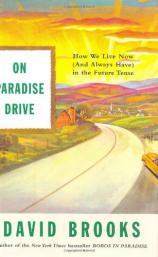On Paradise Drive: How We Live Now (and Always Have) in the Future Tense
Review
On Paradise Drive: How We Live Now (and Always Have) in the Future Tense
As you drive through this great land of ours (if you can afford the
price of gas, that is), consider what kind of America we live
in.
Is this a noble country of eternal optimists who maintain that
anything is possible for those willing to work hard enough? Or does
it consist of an environment where the rich get richer and float to
the top like cream while the middle class struggles to tread water;
a collection of shallow citizens obsessed with the latest gadgetry
and planning their kids' educations before they're out of the
delivery room?
David Brooks took this trip, and he doesn't paint a very pretty
picture. ON PARADISE DRIVE offers all those qualities and
characteristics that demean Americans in the eyes of the world: too
materialistic, too hedonistic, too ambivalent.
Brooks divides his book into distinct sections. The first describes
the "lay of the land," the persona of communities, such as "crunchy
suburbs" ("stoner versions of regular suburbs") whose denizens
drive cars with bumper stickers proclaiming their love for trees
and random acts of kindness or metropolitan areas with their hectic
pace and claustrophobia.
Another category of chapters deals with individuals. Brooks loves
to label; he separates people into two basic types --- blondes and
brunettes. The former group, he argues, is more concerned with
maintaining appearances and acquiring possessions and possesses an
air of entitlement; the latter is more "earthy." Finally, he
discusses the aspects that make up our lives --- how do we grow,
learn, pray and work?
Whether he realizes it or not, both demographics fit into Brooks's
mindset of "milk-and-honey obliviousness" and holier-than-thou
attitudes. He is especially piquant with his observations on such
suburban issues as SUV superiority, grill-envy and "ubermoms" (and
dads), women in their mid-upper thirties with advanced degrees who
have decided to stay at home to oversee the kids (with help from
their au pairs, of course; "three is the new two" when it comes to
raising a 21st century family), smoothing the way as much as
possible for their children's future success.
Goodness knows he has my New Jersey town down cold. It's an amalgam
of zones, (with their "driveway basketball hoops, and seasonal
banners over the front doors") and people, each of whom must feel
superior to the other, both those who eschew materialism (to a
degree) for the high ideals of their liberal upbringing and
subsequent education, and those professionals who commute to their
high-powered jobs in Manhattan.
Ultimately, ON PARADISE DRIVE boils down to expectations, both
realistic and unrealistic. These are the dreams and desires foisted
upon us by those whose opinions we care about (family and friends),
as well as those we shouldn't (advertisers count on our
insecurities as they try to convince us how much better life would
be if we used their products). "Why do we torture ourselves with
things we don't have and aren't likely to get?" asks the
author.
And what about Brooks himself? Is he an intellectual or a consumer?
One might easily conclude, after reading his latest offering, that
the two are mutually exclusive. But it is difficult to tell. As a
columnist for the New York Times and several other media
entities that could be classified as intellectually elitist, he no
doubt is a member of that upper echelon. But he is also a
self-proclaimed "comic sociologist," so it's not easy to know where
spoofing enters into the picture. He is a modern-day Jonathan
Swift, lambasting (with tongue-in-cheek) many of these well-heeled
Americans for their sense of entitlement and their desire for
bigger, better, new and improved, echoing the sentiments of both
our allies and enemies who view us as too materialistic and never
satisfied.
He is an equal-opportunity curmudgeon, taking to task those
complacent with what they already have, as well as those who are
constantly seeking to improve their already-enviable
situations.
Can consumerism co-exist with intellectualism? In discussing a
certain well-known food store chain catering to socially and
health-conscious consumers, Brooks notes:
"The folks behind this enterprise have managed to come up with
globally concerned stomach filler that tastes virtuously of sawdust
ground from unendangered wood. For kids who come home from school
screaming, 'Mom, I want a snack that will prevent colo-rectal
cancer,' there's Veggie Booty with kale, baked pea-pod chips,
roasted plantains, wasabi peas and flavor-free rice clusters. If
you smuggled a bag of Doritos into Trader Joe's, some preservative
alarm would go off, and the whole place would have to be fumigated
and resanctified."
Like an accident from which we can't avert our eyes, books like ON
PARADISE DRIVE conspire to drive us crazy by making us think about
the meaning in our lives.
Reviewed by Ron Kaplan (ronk23@aol.com) on January 13, 2011
On Paradise Drive: How We Live Now (and Always Have) in the Future Tense
- Publication Date: May 25, 2004
- Hardcover: 320 pages
- Publisher: Simon & Schuster
- ISBN-10: 0743227387
- ISBN-13: 9780743227384




